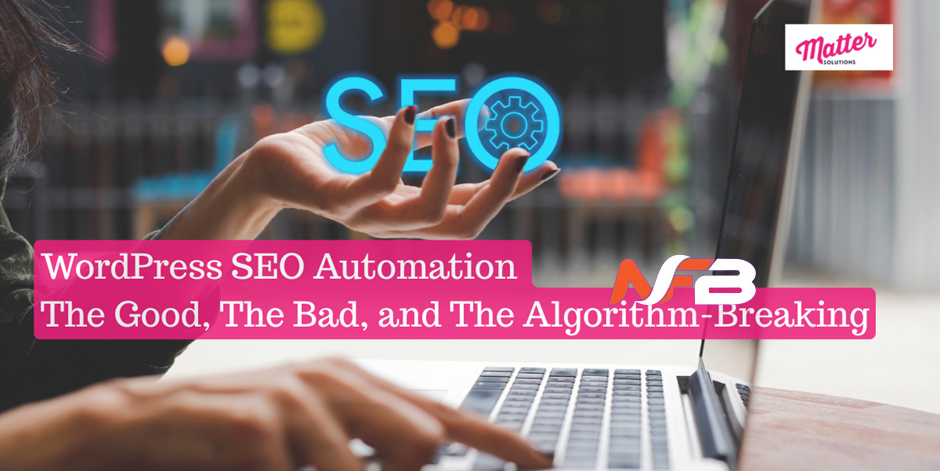WordPress SEO automation sounds brilliant, doesn’t it? You install a plug-in, sit back, and watch your site climb the search results. But frankly, it’s not that simple. Tools like Yoast and Rank Math offer awesome features, yet they can’t replace the human touch that success in SEO requires.
At Matter Solutions, we’ve watched countless clients struggle with this exact challenge. So we understand the real story behind WordPress SEO automation.
In this article, we’ll explain the gap that AI tools are unable to fill. You’ll also learn where some tools help you and make your life easier when you have to perform repetitive tasks. Plus, we’ll reveal some WordPress automation problems that are bad for your SEO.
Read on to learn how to use WordPress automation properly while dodging its main traps.
Expert Strategy: The Unfillable Gap for AI SEO Tools
AI SEO tools can’t make wise business choices, get your brand’s voice, or link your SEO work to actual money-making goals. They miss the human touch that understands what customers seriously want and how to plan a strategy for the long run.
In other words, no AI tool can figure out which pages make you money right now. That’s because strong SEO starts with something simpler: knowing your business goals before you even open a plug-in.
Without understanding those goals, you’re just testing random things and hoping they work (might as well ask a magic eight ball!).
Let’s go through how experts approach this strategy compared to how robots do.
How to Connect SEO Actions with Main Business Goals?
You link SEO tasks to your business goals by matching each job to real money results. Now, human experts look at websites differently from computer programs. They focus on what helps you earn money instead of what looks pretty on a report.
Unfortunately, SEO plug-ins take a different approach. They treat everything the same way. Missing description? Fix it. Not enough keywords? Add more. But finding what changes will bring you customers? Good luck with that! These tools have no clue.
That’s why you need an expert to handle such things. They will put effort where it counts most. For instance, experts know that fixing your pricing page might be worth way more than tweaking some old blog post to gain customers.
Pro-Tip: Always track which pages bring in sales or leads before making SEO tweaks. That way, you’ll avoid wasting effort on less impactful pages.
Integrating Data from Google Search Console
Google Search Console (GSC) is Google’s free tool that shows how people find your website and what they do next. You can use GSC data to identify real opportunities for your business’s growth by combining your search info with click rates, page performance, and visitor behaviour.
Experts take it to the next level, though. What do they do? They further mix this information with website stats, competitor research, and market knowledge to see the whole picture (it’s like finding gold in your traffic stats).
When you follow similar approaches, you find scopes that computer programs completely miss. Like, you might find out that people search for one thing but leave upset because your content talks about something totally different.
Trust us, these findings will help you make effective choices for your business.
The Real Wins from Using the Best WordPress SEO Plug-in
Once you’ve got a good strategy in place, automation can help you do things faster. Tools like Yoast SEO, Rank Math, and AI-powered software work as your helpers. They take care of your repetitive work and keep everything accurate.
AI tools can make your life easier in these instances:
- Simplifying On-Page Edits:WordPress plug-ins save you from coding every single element. They allow you to add title tags, descriptions, and markup across your whole site in minutes. For example, Rank Math lets you create templates that apply the right format to hundreds of pages at once.
- Speeding Up Keyword Data Analysis:AI tools can process thousands of keywords in seconds. They test your ideas about what people search for and find content opportunities you might miss. What once took an entire day of research now happens in minutes, which gives you more time to create content.
These automation advantages free you up to focus on the bigger picture and move your business forward. But in truth, not all automation will help you. In some cases, the wrong setup will genuinely harm your site.
Where Does WordPress Automation Create SEO Problems?
WordPress automation can cause SEO problems in three major ways:
- It often gives out dull content that sounds the same everywhere. We’ve all come across those lifeless posts that add no value.
- Plug-in scores can mislead you and push you into bad habits.
- Automatic linking sometimes connects random pages that make no sense together.
Time to dig into the largest problems that arise when automation slips out of your control.
The Generic Output of Most SEO AI Content
AI can write text all day long, but it struggles with your brand’s unique voice, local details, and real know-how that only you have. And if you didn’t know already, search engines now reward content that shows your genuine knowledge and experience.
So when you let AI write without any human help, those tools create content that sounds like everything else floating around the internet.
Here’s how AI output can tank your position on the search engine results page:
- Lack of Nuance:AI misses important market differences that human writers catch naturally. For example, AI writes generic “small business marketing”, while human experts focus on local relationship-building strategies.
- Repetitive Information:If you look carefully, you’ll notice that AI content is mostly boring repeats of existing Google results instead of fresh perspectives. But human experts usually share unique case studies. Doing so demonstrates your experience on a given topic.
- No Real Authority: In particular, AI can’t share firsthand experience or original insights like humans. It misses personal problem-solving stories that build trust and fails to show your genuine expertise with customers (it’s hard to fake scars you never earned).
Why Yoast SEO and Rank Math ‘Green Lights’ Are Misleading
Those green lights you see on your automated SEO tools like Yoast SEO and Rank Math? They don’t guarantee SEO success. In fact, these tools follow strict rules that often push you into bad habits… unless you know what makes sense for each page.
Based on our experience, the greater issue here is that those plug-ins treat every piece of your content the same way. It’s pretty much like using the same traffic signal for every road. On a quiet country lane, a red light just feels pointless. But on a busy motorway, you’d cause chaos without proper signals.
Let’s look at where this one-size-fits-all approach goes wrong:
- Encouraging Keyword Stuffing:When you only focus on keyword density, your writing starts to sound awkward. Your readers notice it instantly and often leave. A better approach here is to write naturally for people first. Search engines reward that kind of content in the long run.
- Ignoring Readability for Rules:Plug-ins usually push shorter sentences when longer explanations work better for complex topics. For example, technical subjects need detailed explanations that an artificial breakdown makes harder to understand.
- Technical Conflicts:Many plug-ins override the built-in recommendations, which makes chasing those green lights pointless. Even more, when a writer ends up chasing perfect scores, the real SEO issues, like slow loading time,s go unnoticed. So, focus first on your site speed and user experience because they make a higher impact on search results.
So if you rely on colour scores, you’ll never see real results. It’s that simple.
The Hidden Dangers of Automated Internal Links
The main risks of automated internal links include random keyword-based connections that confuse users, messed-up reading flow, and weak SEO signals failing to build topic authority. These tools can also create way too many links that look spammy. Search engines hate these things.
Here’s why automated linking can backfire spectacularly:
- Irrelevant Connections:Simple keyword matching can create confusing links between unrelated topics. Like, those tools may link “apple pie recipes” to “Apple computers” articles, which will leave readers expecting baking tips but finding tech reviews. Not funny!
- Poor User Experience:If you use automated tools to link articles internally, links can appear in weird places that disrupt reading flow and break visitor trust. Say, a cooking article might suddenly link to a software page in the middle of a sentence. But a manual link would have guided your readers to something useful.
- Weak SEO Signals:Generic anchor text fails to build topic authority compared to strategic, descriptive linking. It’s because meaningless connections everywhere dilute your site’s relevance and confuse search algorithms about your expertise.
In simpler terms, click “auto-link all”, and you’re handing Google a spam grenade. Are you sure you want to do that?
Balancing Technology with Strategy
Undoubtedly, WordPress automation and AI tools are brilliant assistants. Except… they are never your replacements for real expertise. True SEO success comes from using these tools’ speed and efficiency to support a clear, well-thought-out plan led by experienced specialists.
In this article, we’ve discussed how WordPress automation can speed up your SEO work through tools like Yoast and Rank Math. But you’ve also seen the downsides of how AI content lacks personal touch, plug-in green lights mislead users, and automated linking creates confusion.
If you want to skip the trial-and-error, our team at Matter Solutions can help. We combine the latest automation with a hands-on strategy for you to get the best results. Let’s chat about your goals and build an SEO approach that works for your business.














Leave a Reply